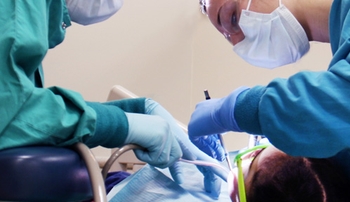Just four months into her new job as dental clinic director for the Omaha Tribe of Nebraska, Stephanie Lake, D.D.S., was shocked by what she found.

|
| Children across Nebraska will have greater access to dental care through two new grants totaling $3.5 million. |
The lack of a full-time dentist for the past four years had taken a toll on the oral health of the tribe’s children.
Dr. Lake had never seen cavities, abscesses and tooth decay so severe in children so young.
“One 4-year-old had cavities in 16 out of 20 teeth,” she said. “There is more treatment here than I could ever do alone.”
But help is on the way.
In October, an affiliation agreement was signed with the Omaha Tribe that allows pediatric and adult dentistry residents, dental assistants and faculty from the UNMC College of Dentistry to provide services at the dental clinic in the Carl T. Curtis Health Education Center in Macy, Neb.
Funded by two grants totaling $3.5 million from the Health Resources Services Administration, the program gives senior dental students and more pediatric residents the opportunity to practice in a rural community.
“It wasn’t until three years ago that we could send a few pediatric residents on rural rotations. Now, all eight pediatric residents can participate, and we’ve increased the length of the rotations for senior dental students from four to six weeks,” said Kimberly McFarland, D.D.S., professor in the UNMC College of Dentistry and principal investigator on the grants.
Rural rotations as a permanent part of the dental school training experience significantly increases critical access to dental care in rural and underserved parts of the state, she said.
It’s the type of care that is vitally needed on the northeast Nebraska Indian reservation. In December, pediatric residents screened 70 children at the tribal clinic and plan to return monthly to provide restorative care and more screenings.
Approximately one-third of the children between the ages of 3 and 5 screened on Dec. 5 will require general anesthesia for their dental work due to their young age and severity of tooth decay, Dr. Lake said.
Those children, she said, will be sent to UNMC for their treatment.
Along with providing an extra set of hands in rural communities like Macy, a key component of the grant is to promote the use of the statewide tele-health network by equipping senior dental students with intraoral cameras and laptop computers to take on their rotation.
With the equipment, the students are able to consult with specialists at the College of Dentistry enabling them to become familiar with the technology and the benefits of using it in a rural setting.
The hope, Dr. McFarland said, is that once the students are exposed to the needs and charm of working in a rural community, some will practice there.
“We have 20 counties in Nebraska that have no dentist whatsoever and 30 others where there are only one or two dentists,” she said. “We need to find ways to not only expose our students to rural practice but encourage them to return to those communities with the promise that through technology the College of Dentistry will support them.”